The soup that gathers the tribe and kicks off the wedding
Or how the wedding day begins in Romani culture

In the sphere of “first world problems,” few things are more daunting and stressful than the morning of a wedding day. Even outside of the “first world” bubble, like for our Roma tribe (which has been living in extreme poverty for generations,) weddings always entail a million moving pieces that have to be carefully choreographed. Hair and makeup, venue, camera and photography, live music, dozens upon dozens of customs and rituals, and countless planned and unforeseen challenges.
On the morning of a Romani wedding day, however, all this has to wait.
Until everyone eats soup.
The reception before the wedding
At around 8:00 in the morning, under the open sky, a fire is lit. A huge metal pot is placed upon it. An elderly woman from the tribe begins to prepare a rich, delicious soup meant to feed everyone.
Around her, the air is full of life. Relatives bring piles of ingredients to her side, place loaves upon loaves of bread to be served later with the soup, arrange long tables with dozens of chairs, and set up tents above.
Gathering so early in the morning “for the soup” is like a wedding reception before the ‘real’ wedding reception. Relatives who live far away, travel early, specifically so they can join in the morning soup custom. The jokes, banter, hugs, and festive mood begin long before the soup is served. While the elderly woman and her helpers are still cutting up tomatoes and meat, people are already playing cards, listening to music, and dancing.
When the soup is ready, it is carefully distributed on plates and served at the long tables.
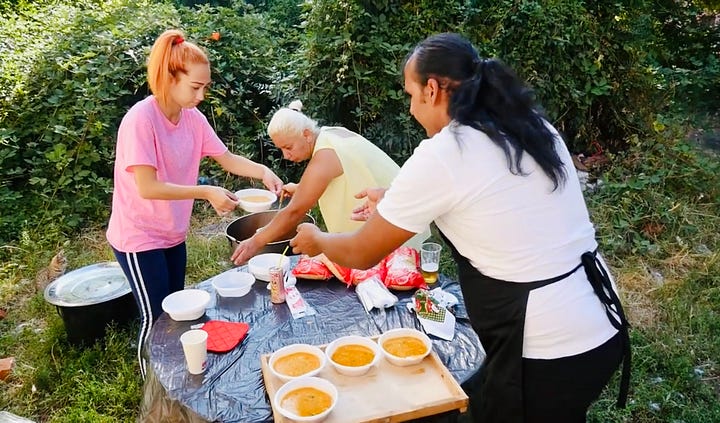
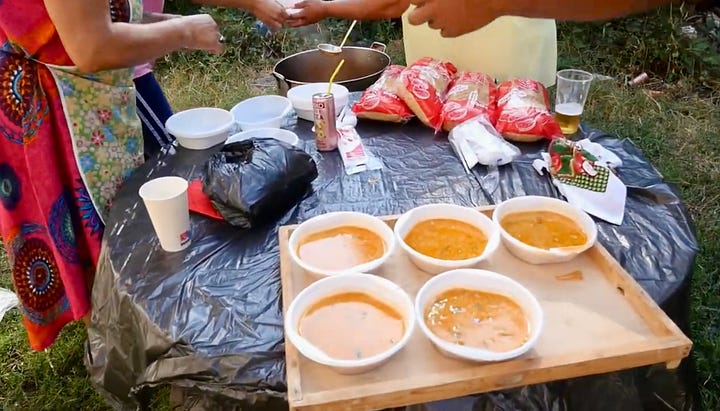
Roughly around this point, another key element of the tradition comes into frame. A Roma orchestra begins playing.
These drums are unmistakable. When you hear them, you know what’s happening: “The Romani are celebrating again.” And you find people from mainstream society glued to the windows of their homes or their cars, unable to look at anything else.
And this is the thing about the Roma orchestra. This is the entire point. You can’t miss it. Everyone hears it. Even the Gods.
From “Beating the Drums: Why Romani orchestras herald every celebration”
The energetic charge of this early-morning soup custom is so powerful, that an outsider would be forgiven to mistake it for the actual wedding.
The drums overpower the traffic noise from the nearby boulevard, and even though only some drinks, bowls of soup, and slices of bread are on the table, the atmosphere is one of a Dionysian feast.
People eat, laugh, and dance.


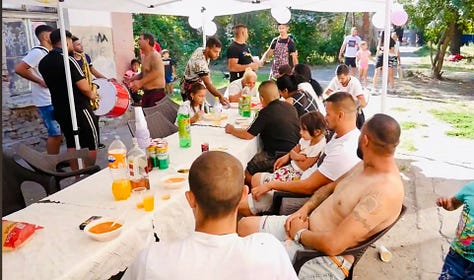

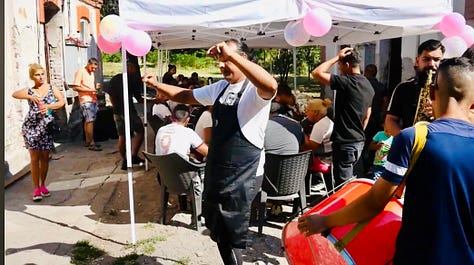
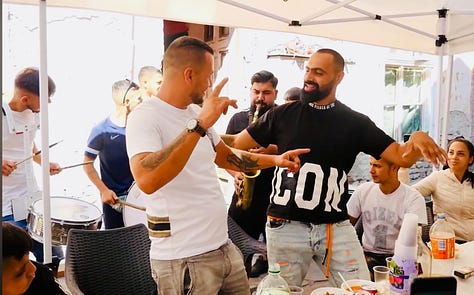
It is only after the soup is eaten, that everyone proceeds to get ready for the actual wedding.
What is the meaning of the soup?
The soup is significant. It serves a very important purpose: it paves the way for a smooth wedding. And by “smooth wedding”, the Romani mean something very different than most others.
The soup is called “Kurban chorba” which translates to “sacrificial soup.” Its key ingredient is lamb meat, the purest and most innocent of animals. A lamb is sacrificed and roasted on Ederlezi, the biggest Roma holiday, which also begins with a very important early-morning ritual honoring the lamb’s life.
Having “Kurban chorba” at a wedding has been a tradition across the Balkans for a long time. Nowadays, at least in Bulgaria, the tradition has mostly died out and can sometimes only be found in rural villages. For the Romani, however, it is still alive and vibrant. Not only that, but the soup is not just part of the wedding - it heralds the wedding.
Everyone gathering to eat the soup also serves an important purpose for the Romani, beyond the obvious joy and fun. This is not meant to be “just a party” even though it is more of a party than most mainstream full-scale weddings.
According to the custom, if you sit down to eat soup to the drums of the orchestra, then you are obliged to attend the wedding later in the day.
The Romani begin the wedding day with a sacrifice before anything else and sit down to eat all together as a form of a promise to attend the wedding. This, in Roma culture, holds more power than any piece of paper or institution.
In our piece “Untethered Together: The unofficial and unscripted nature of Roma marriages”, we explained how the Romani don’t get married before a priest or any kind of person of authority, don’t respect pieces of paper telling them if they are married or not, and do not even exchange vows or promises at weddings. Two things make the marriage “official” in Roma culture: the presence of the tribe and the drums of the orchestra. And the only thing that makes it last is the understanding that the husband and wife need to show up for each other day after day.
The link between the orchestra and the tribe is as strong as it is difficult to define. The orchestra is there to give expression to the joy. If it’s not there, the joy remains unexpressed. Unannounced. Hidden from the world. And if the orchestra is there, but the tribe is not, then whose joy is the orchestra expressing? Whose love? Whose welcoming? No ones. The music might still be loud, but it will be without fire.
From “Beating the Drums: Why Romani orchestras herald every celebration”
All the blessings and all the good fortune for the newlyweds come from the tribe and the music. So for the Romani, the wedding holds a powerful charge. It has nothing to do with appearances and everything to do with upholding customs with a fierce, pure heart. Channeling the love of the tribe and the divinity from the open sky in order to bless the new family.
So in the early morning of every wedding, under the open sky, to the ancient beat of drums, the air carrying a tinge of smoke from the fire, the Romani gather to eat soup.
And with that, they give a promise: That the new family, their future children, and their future grandchildren, will always be surrounded by the love of the tribe.








